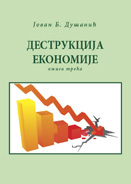| NSPM in English | |||
As Greek Drama Plays Out, Where Is Europe? |
 |
 |
 |
| недеља, 02. мај 2010. | |
|
(The New York Times, 30.4.2010)
Once again — as during the 2008 financial crisis and the more recent halt in European air traffic due to volcanic ash — European leaders have failed to surmount national interests and cobble together a coherent policy quickly enough to address a problem. In the process, they may have done permanent damage to the credibility of the European Union. “There is no doubt that the European project has suffered structural damage from this,” said Jacob Kirkegaard, a research fellow in European affairs and structural reform at the Peterson Institute for International Economics here. “It’s clear that the I.M.F. is the last man standing and is structuring the program.” Criticism is rising about the competence of European leaders, which has worsened the plight of all the countries in the euro zone. Senior United States officials, while not wanting to interfere in a European problem, have nonetheless expressed their anxiety to European counterparts and to the monetary fund itself. President Obama called Chancellor Angela Merkel of Germany on Wednesday to lend his support and encouragement for her willingness to take a bolder position to try to calm the markets. Mrs. Merkel has been the central figure in the debt crisis, as she has tried to respond to German voters’ displeasure at having to bail out Greece, after years of bailing out eastern Germany. She delayed action on the problem for months, hoping to put it off until after critical regional elections on May 9. Ultimately, that proved impossible. But her foot-dragging, combined with her insistence that Greece pay a severe long-term price for its profligacy and that the German Parliament approve any bailout, gave the markets both reason and room to run up the price of Greek debt to unsustainable levels. That forced the International Monetary Fund and the Europeans on Wednesday to practically quadruple the commitment to Greece, to try to calm the markets and not turn their attention to Portugal, another weak reed. “The fact that a German regional election can play such a disproportionate role in messing up efforts to contain what was a much smaller crisis several months ago is astonishing,” Mr. Kirkegaard said. And the fact that there will be no European Union summit meeting until May 10, after the German elections, “is so blatantly political,” he said. “This is no way for an E.U. that has to contain an accelerating crisis and market panic to behave,” Mr. Kirkegaard said. The European monetary union was simply “not ready for bad weather,” said Janis A. Emmanouilidis, a senior policy analyst at the European Policy Center in Brussels, saying it had no mechanisms in place to deal with issues of debt or the potential default of a member state. “In the absence of such clear mechanisms, you need political leadership,” he said. “But the past months have seen a lack of leadership.” The same problem was raised earlier this month by the ban on European air travel because of the ash spewed by an Icelandic volcano. With no European Union agreement governing European airspace, national leaders struggled, with astounding delays, to coordinate a policy while both airlines and passengers suffered. But even worse, “the current crisis has done enormous political damage,” Mr. Emmanouilidis said. “It is decreasing the trust among member states,” he said, with Germany feeling betrayed by the “Club Med” countries of southern Europe, while those nations feel that Germany has procrastinated and shown an egregious lack of solidarity. The outspoken Greek deputy prime minister, Theodoros Pangalos, has said that European Union leaders were “not up to the scale of the task” in dealing with the crisis. “I believe if Delors was in charge in Europe, Mitterrand in France and Kohl in Germany, things would not be the same,” he told Greek television in February, referring to the former president of the European Commission, Jacques Delors; the former French president, François Mitterrand; and the former German chancellor, Helmut Kohl. While there is blame to go around on the national level, there is also finger-pointing at the new European Union leadership. Herman Van Rompuy, president of the European Council, has been largely invisible in his efforts to coordinate national leaders. A French member of the European Parliament, Philippe Juvin, vented to Agence France-Presse: “Where is the president of the European Council? What is the president of the Commission doing? Is there a European pilot in the Greek crisis? Or are they waiting for the collapse of the euro?” But the Lisbon Treaty that created Mr. Van Rompuy’s position, and which was intended to make the enlarged European Union more agile and coherent, deliberately left out powers for coordinating fiscal policies, which are the fiercely guarded prerogative of the separate nations. Even so, countries like Germany can only blame themselves for not insisting on realistic European oversight of Greek statistics, which were widely believed to be false for two decades. Some analysts argue that this latest crisis will inevitably mean further European integration, with more fiscal oversight and coordination. Constance Le Grip, a French member of the European Parliament, said that “it is clear that the E.U.’s hesitations have worsened the Greek situation.” She added: “Pragmatism and the E.U.’s adaptation skills are not sufficient anymore. We have to create new institutional responsibilities, for a new European economic government.” But others are doubtful, arguing that most Europeans are already fed up with “more Europe” and that Germany, which might like to meddle in the budgets of others, would never accept any meddling in its own. It is also very likely that the German Constitutional Court, which has put limits on the ceding of sovereignty, would throw out any such oversight. Some, like Mr. Kirkegaard, fear that the German court will rule against the Greek bailout funds, too, especially if they are spread out, as now envisaged, over a three-year period. Still, this continuing crisis is leading to a more fundamental one, about European and national capabilities. “Questions are asked to nations, not to the E.U. — but nations cannot deal with this problem alone,” said Dominique Reynié, director of the Foundation for Political Innovation and a political scientist at the Institut d’Études Politiques de Paris. “The silence of the E.U. and its institutions has become deafening. It is incapable of demonstrating that an entity called Europe exists. This is a situation that cannot go on.” The European Union “seems to be in a state of permanent self-promotion,” he said. “But it cannot ask its voters to relinquish part of their nations’ sovereignty and then not answer the call when there’s a problem.” Maïa de la Baume and Nadim Audi contributed reporting from Paris. http://www.nytimes.com/2010/04/30/world/europe/30europe.html?hp |
Од истог аутора
Остали чланци у рубрици
- Playing With Fire in Ukraine
- Kosovo as a res extra commercium and the alchemy of colonization
- The Balkans XX years after NATO aggression: the case of the Republic of Srpska – past, present and future
- Из архиве - Remarks Before the Foreign Affairs Committee of the European Parliament
- Dysfunction in the Balkans - Can the Post-Yugoslav Settlement Survive?
- Serbia’s latest would-be savior is a modernizer, a strongman - or both
- Why the Ukraine Crisis Is the West’s Fault
- The Ghosts of World War I Circle over Ukraine
- Nato's action plan in Ukraine is right out of Dr Strangelove
- Why Yanukovych Said No to Europe

.jpg)





















